Sous Vide Corned Beef Brisket Spices

There are tons of different ways you can cook corned beef, but if you want the easiest and most hands off way, it's definitely using the sous vide method! Honestly, I can't remember any corned beef being easier to cook, and I make 2-3 a year, every year around St. Patrick's Day.
I've done the traditional boiled dinner, I've braised the corned beef in the oven, I've used a slow cooker, and a pressure cooker. My recipe for corned beef and cabbage using pressure cook and then air fry in the Ninja Foodi is absolutely delicious, but it requires quite a bit of hands-on cooking. So, if you are more the set-it-and-forget-it kind of cook, then sous vide cooking is the way to go.
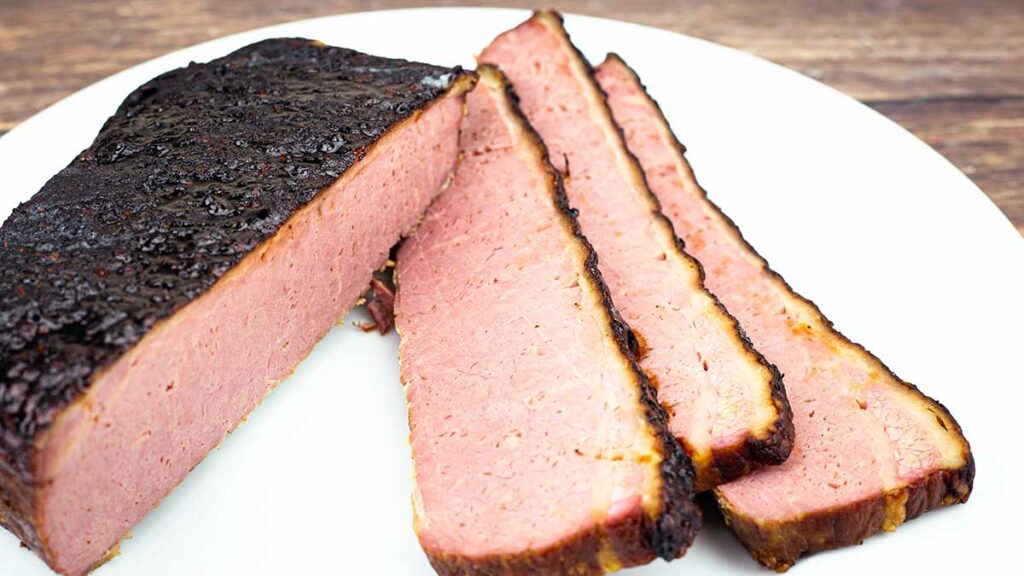
Of course, there is a trade off. It is a slow process to properly sous vide a corned beef. I found that between 24-36 hours is the range for the best corned beef and this sous vide corned beef recipe calls for 36 hours of cook time, and this is based on my experiment where I cooked a corned beef using a sous vide bath and checked the texture every 2-4 hours starting at 10 hours. I will go over all of my findings in this article in the section called, "Temperature & Timing for Corned Beef."
Frequently Asked Questions
What is Corned Beef?
Corned Beef is a beef brisket that has been cured in salt. You can do this yourself at home, but it takes at least 10 days. Here is a recipe from Kevin is Cooking that walks you through the process of corning your own brisket to make corned beef: How to Make Corned Beef.
One of these years, I will get around to making my own, but for this recipe I bought one ready to go at the grocery store. While you can use a plain beef brisket in this recipe, you will end up with more of a beef roast than corned beef. There is a certain flavor and texture to corned beef that you can only get from either curing it yourself or buying one. The curing is also what gives corned beef its signature pink color.
What Cut of Corned Beef is Best?
There are two different cuts of corned beef regularly sold at grocery stores, the flat cut and the point cut. While you can use either one, I strongly recommend the flat cut for sous vide cooking.
The point cut is a fattier cut with more connective tissue and it definitely can be more flavorful due to the increased fat content, but it also has more connective tissues which can result in a tougher texture.
I did not test the point cut using sous vide, but you can absolutely use it. You may find that you have better success if you increase the sous vide temperature to around 180℉/80℃ because the higher heat will break down the connective tissues a little quicker.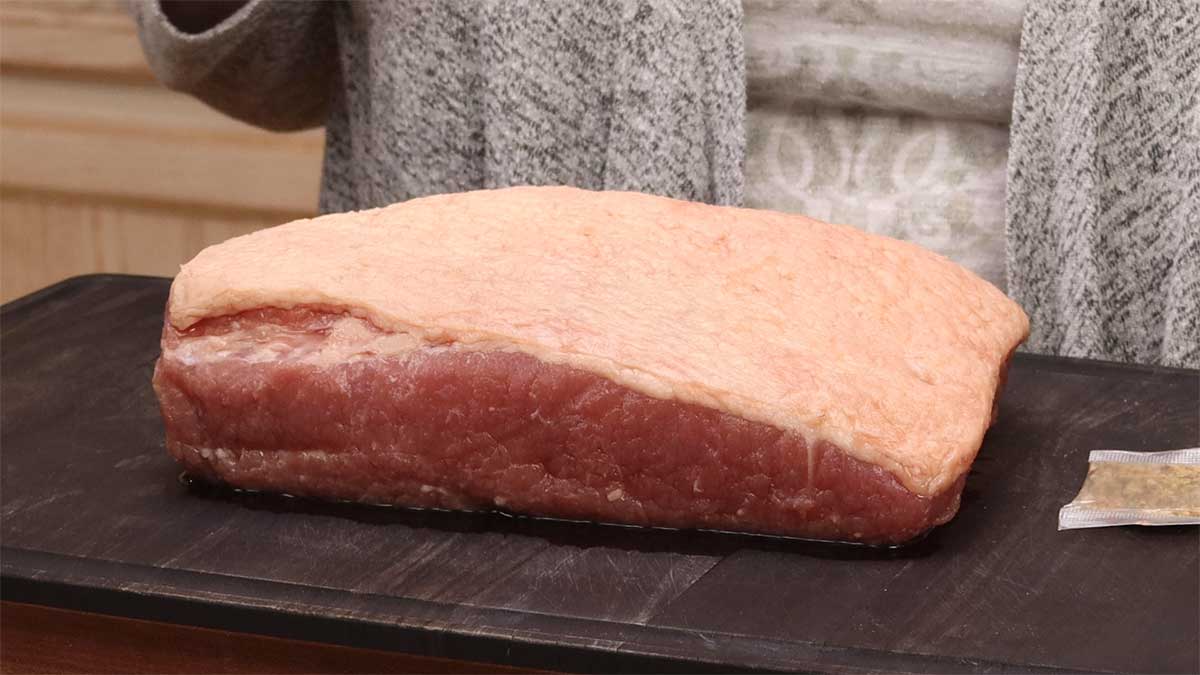
What is Sous Vide Cooking?
Sous Vide cooking is simply cooking food in a sealed container in a water bath that is held at a precise temperature throughout the cooking process. This method of cooking has been practiced for many years, but gained popularity among home cooks when sous vide circulators were manufactured for home use.
Since that time, big appliance brands have also included sous vide functions on other appliances, like the Ninja Foodi Pressure Cooker & Air Crisper or the Instant Pot Duo Crisp. While there is a difference between an immersion circulator and multi-use appliances that have a sous vide function, you can use either with great success.
The one thing I do recommend is testing your appliance for accuracy before sous vide cooking for the first time. To do that, fill the inner pot with 10 cups of water, put on the lid as directed in your instruction manual. Set the temperature for 150℉/70℃ and let the pot heat up. Once the appliance has indicated that you have reached the cooking temperature, use a reliable instant read thermometer and measure the water temperature. It should be within a few degrees of the 150℉/70℃. I have noticed that the Ninja Foodi runs a little hotter at first by about 10 degrees, but evens out through the cooking process. If your temperatures are off by more than 10 degrees then your appliance is not accurate enough for precise sous vide cooking. You can, of course adjust for that by setting the temperature 10 degrees lower than your desired temp if it consistently runs 10 degrees hotter than what you set.
The advantage of a stand-alone sous vide immersion circulator is that it circulates the water around the food for more even cooking and they also are able to be set for very precise temperatures. For example, if you have a multi-use appliance like the Ninja Foodi and the recipe calls for a temperature of 153℉, you will either have to set it to 150℉ or 155℉ because you cannot dial in an exact temperature. You are limited to the preprogrammed temperatures on the appliance. Most of the time this isn't a big deal and I have used the Ninja Foodi PC & AC sous vide function many times and have always had great outcomes.
Equipment Needed for Sous Vide Cooking
In theory, you don't even need a special appliance to sous vide cook if you have the ability to maintain a specific water temperature some other way.
For example, you can sous vide cook on the stove if you don't mind standing there to constantly regulate the temperature or, for some sous vide recipes, you might be able to use your slow cooker if you know the temperature it reaches and holds when on a specific setting.
However, in most cases this will be very labor intensive and not very practical since most sous vide recipes call for a long cook time. The idea behind sous vide cooking is that you can set it up with your food and pretty much ignore it until the time is up.
If you are interested in sous vide cooking, a much better way to get into it if you don't have a sous vide cooker already is to purchase an inexpensive one. You can purchase a sous vide device for as little as $50.00. I like the Anova brand, but if you are just getting started go with one that has decent reviews and fits your budget. There is no need to buy an expensive one when you are first getting started.
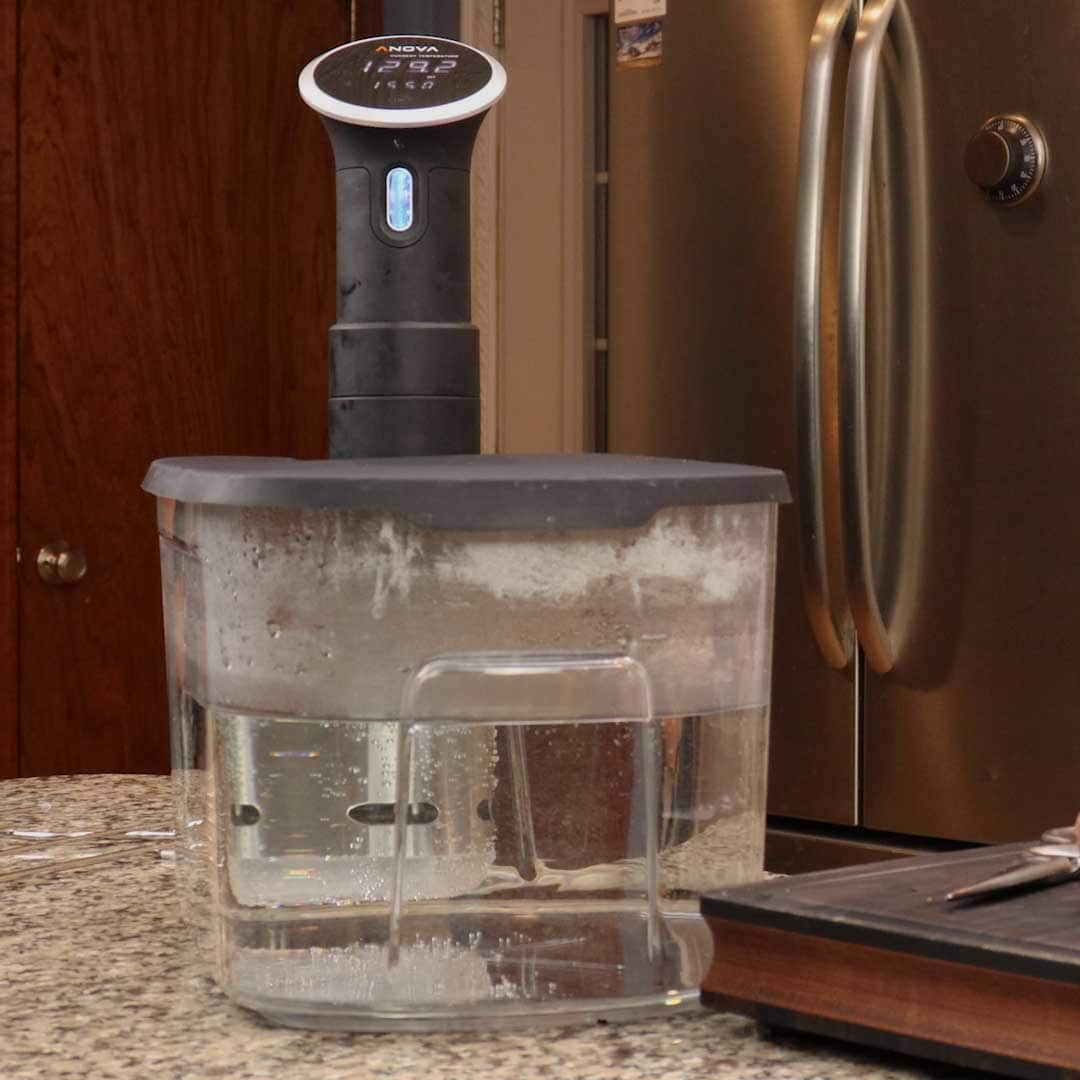
The equipment I recommend is:
- Sous Vide Circulator or an appliance that has a sous vide function, like the Ninja Foodi Pressure Cooker & Air Crisper or the Instant Pot Duo Crisp.
- Ziplock Freezer Bag (quality matters here, so don't go with less expensive bags or they tend to leak) OR a vacuum sealer with good quality bags.
- Large container for your immersion circulator to attach or use the inner pot of your Ninja Foodi or Instant Pot Duo Crisp. *If you have a Foodi or IP that doesn't have the sous vide function, you can still use the inner pot with your immersion circulator, it's a great size!
Temperature & Timing
Selecting the Temperature
When I looked online for sous vide corned beef recipes, I was a little surprised at the high cooking temperature most of them called for. 180℉/80℃ was pretty much the standard. While I can definitely see how this higher temperature would break down the connective tissue quicker, it still seemed like it went against most of what I have read about sous vide cooking large pieces of tougher cuts of beef. Most of those recipes call for temperatures in the 135℉/67℃ to 155℉/68℃ range. Always the rebel, I wanted to see what happened if I went with the lower temperature and settled on 155℉/68℃.
Of course, this doesn't mean that you have to follow along with me, you can certainly increase your temperature up into the 180's and most likely your corned beef will take less time. However, before you do that, let me explain my reasoning behind the temperature I picked. The lower the temperature, the less moisture loss from the meat and this was the main reason that I didn't want to go with a higher temperature. The other reason was the texture of the meat. I don't like my corned beef falling apart. I like it to be sliceable and hold together while being incredibly tender. I felt like the lower temperature would get me closer to that goal and it turned out fantastic. If you want your corned beef more shreddable or falling apart, then I would go with the higher temperature of 180℉/80-85℃.
When selecting the temperature you sous vide cook at, it's important to know that it is perfectly safe to sous vide cook at lower temperatures for longer periods of time. The pasteurization process of food occurs when food is heated to high temperatures (usually around 165℉ for poultry) for a short period of time (just a few seconds) OR when it is heated to lower temperatures for a longer period of time. Also, with the brining process of brisket to make corned beef, any surface bacteria is killed or kept in check by the salt cure. This method has been used for ages to preserve food, way before refrigeration.
One important thing to note if you are using the sous vide function on the Ninja Foodi Pressure Cooker & Air Crisper (except for models with only one lid) or the Instant Pot Duo Crisp is even at the lower temperature of 155℉ there was a good amount of steam produced. These appliances suggest you use the pressure lid with it vented for sous vide cooking and what I've noticed is the lids can get locked into place when the pin pops due to steam. While this isn't that big of a deal, you will have to wait for the pin to drop after the time is up to open the lid. You can also skip the pressure cooking lid and use a pot lid that fits to avoid this.
Deciding on Timing
When you choose a temperature between 155℉/68℃ and 180℉/82℃, your corned beef will be fully cooked after 10 hours. However, it might not be the texture you desire. I found the texture of my corned beef when cooked at 155℉ for 10 hours to be sliceable, but the texture was too tough for me. This temp and timing might be fine if you planned on shaving it with a meat slicer for Reuben sandwiches or if you planned on cooking it longer at a later date.
Here is a table of suggested times and temperatures based on how you want the texture of your corned beef to be. The recommendations are based on a flat cut corned beef that is around 4 pounds. Since the depth of flat cut corned beef is relatively the same no matter how much it weighs, the temps and time should work just fine even if your corned beef is smaller or a little bigger. The average depth of corned beef in my experience is about 3 inches.
| Sous Vide Temperature | Sous Vide Time | Desired Results |
|---|---|---|
| 140℉/60℃ | 36-48 hours | Tender, sliceable steak-like corned beef. Perfect for a corned beef dinner or sandwiches. |
| 155℉/70℃ | 24-36 hours | Tender, sliceable steak-like corned beef. Perfect for a corned beef dinner or sandwiches. |
| 165℉/75℃ | 16-24 hours | Tender, sliceable corned beef. Perfect for corned beef dinner or sandwiches. More liquid loss than lower temperatures. |
| 180℉/80℃ | 10-16 hours | Tender, flakey and more fall apart than lower temperatures. More liquid loss than lower temperatures. |
How to Sous Vide Corned Beef
Prep
Get the Water Heated
The amount of water you need will depend on the container you are using to submerge the corned beef. For the Ninja Foodi or Instant Pot, I start off with 10 cups of water and make sure the bag of meat will be fully submerged.
With the container I use with my sous vide circulator, there is about 2 gallons of water.
The amount of water will determine how long it takes to reach your programmed temperature. The Ninja Foodi only takes 10 minutes or so, while the larger container can take up to 30 minutes.
For this reason, I start the water heating before I get my corned beef seasoned and into the bag. You set the sous vide cooker for the temperature you want to cook your corned beef on. I used 155℉/70℃.
Rinse the Meat
Corned beef usually comes in a bag with juices. Ordinarily, I don't rinse the corned beef with other cooking methods, but because we are cooking for such a long time and seasonings tend to intensify more during sous vide cooking, I do rinse the corned beef before placing it in my sous vide bag.
Season the Corned Beef
This might seem in direct contradiction to what I just said about rinsing the corned beef, but that was to remove the excess salt. Seasoning the corned beef using the pickling spice packet that comes with it or making your own corned beef rub will bring in those delicious flavors of mustard seeds, coriander seed, black peppercorns, and bay leaves that are signature flavors in corned beef.
In this recipe I only used the spice packet that comes with the corned beef and it worked perfectly. Apply the seasoning blend to the fat cap side of the corned beef.
Place the seasoned corned beef in the bag you are going to use for sous vide cooking.
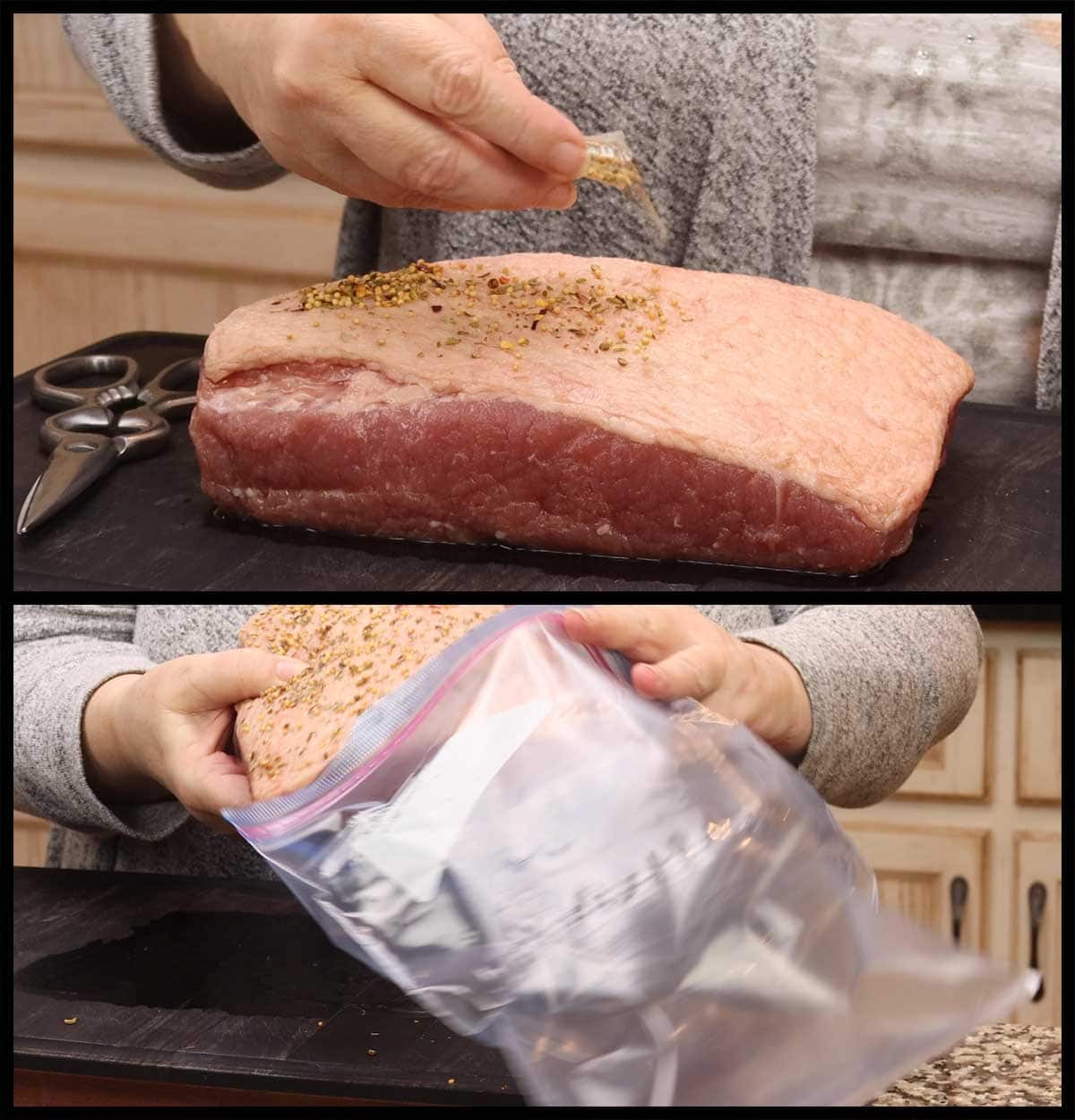
Seal the corned beef in the bag
You can use a large ziplock bag or a bag that is designed for your vacuum sealer. Either is fine. If you aren't sure how long you want to sous vide your corned beef, use a ziplock freezer bag because you can open it and test the corned beef, then reseal it. This is what I did in my testing and it worked great.
You do not need to add any liquid, like beef broth, to the bag. In fact, I encourage you not to, because the corned beef will make its own juices and if you start out with liquid in the bag, it will become very full and awkward to handle.
When using a ziplock plastic bag, I use the water displacement method for sealing.
Water Displacement Method
Put the corned beef into a quality ziplock bag and place it into the water bath, be careful that the open ziplock end doesn't go under the water. Press the corned beef down and allow the water to press against the bag and force the air out. When the entire bag is under water except for the opening, ziploc it closed.
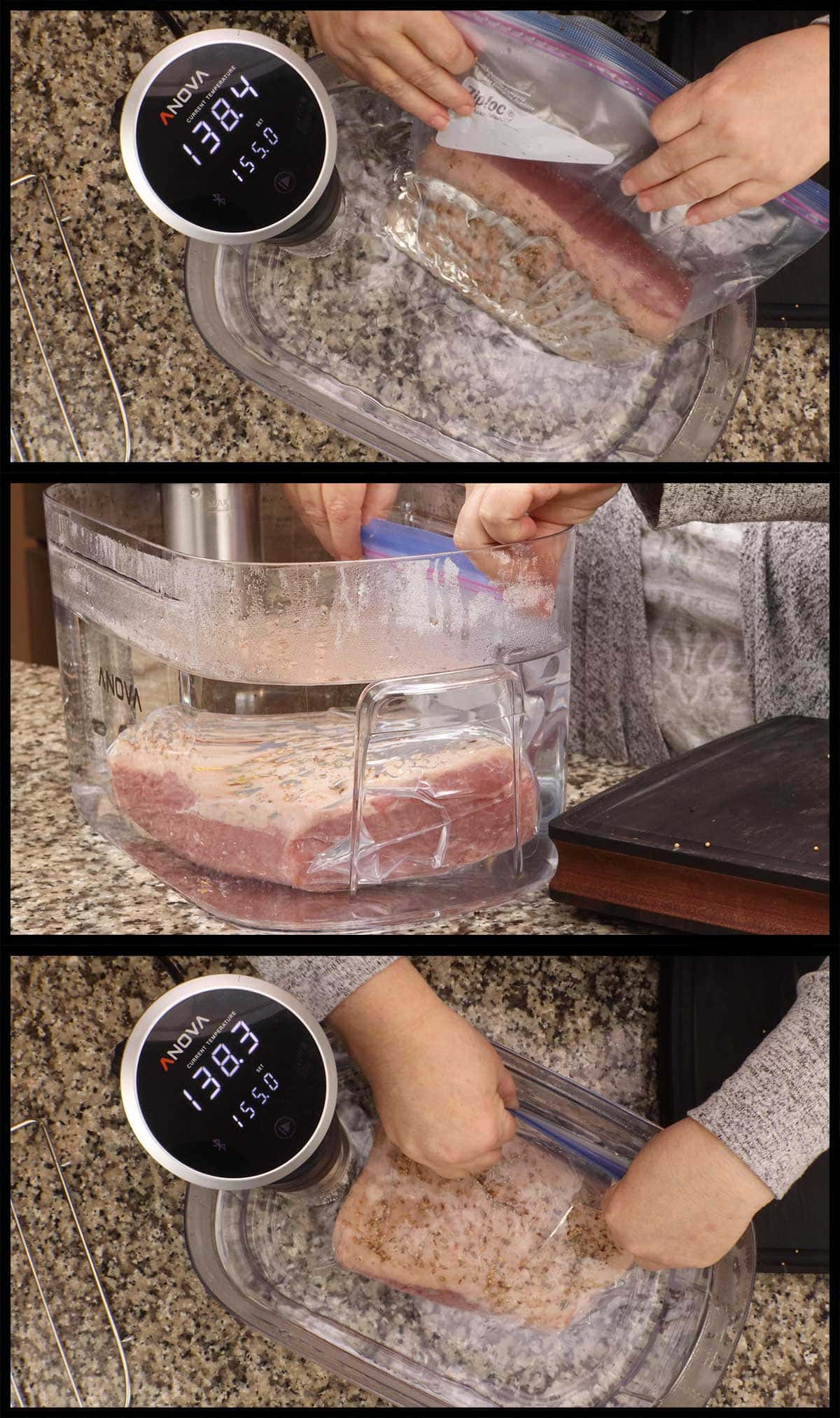
If you prefer to see me demonstrate the water displacement technique, watch the video below.
Vacuum Seal Method
Place the corned beef into a vacuum seal bag and use your vacuum sealer as instructed in the manual to remove the air and seal the bag. *Note: If you want to remove the corned beef to slice off some to test for doneness during the sous vide cooking time, make sure to allow for extra bag space so you can cut and then reseal the vacuum bag.
Cooking
Once the water is preheated, which can take anywhere from 10 minutes to 30 minutes, place your sealed bag with the corned beef into the water bath.
Make sure the meat is completely submerged under the water. If it is floating, check your bag for air. If there isn't any air in it and it's still floating, you can place a plate or bowl on top to help weigh it down.
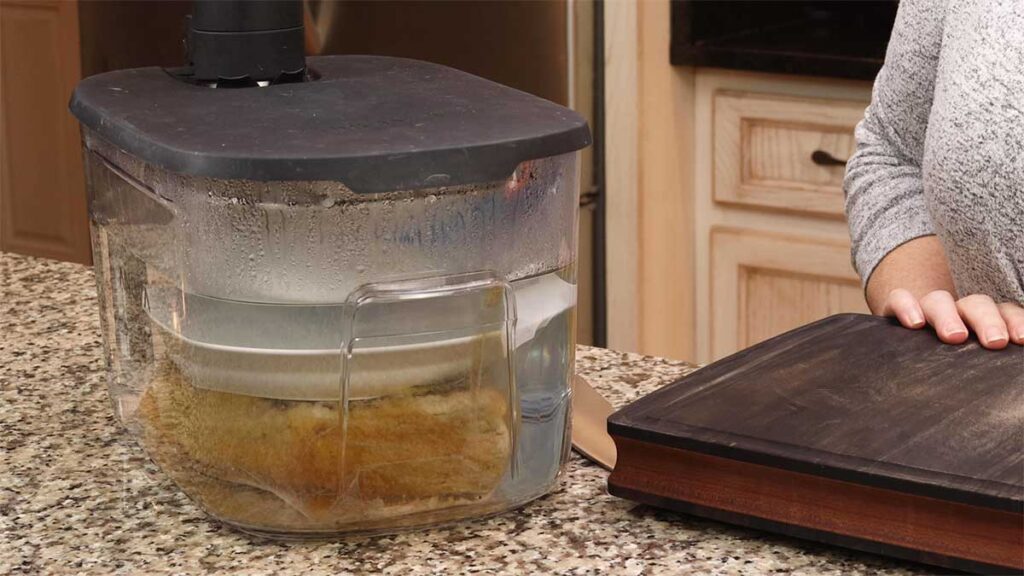
Cover your sous vide container. If you are using the Ninja Foodi Pressure Cooker & Air Crisper, use the pressure lid with the valve vented to cover.
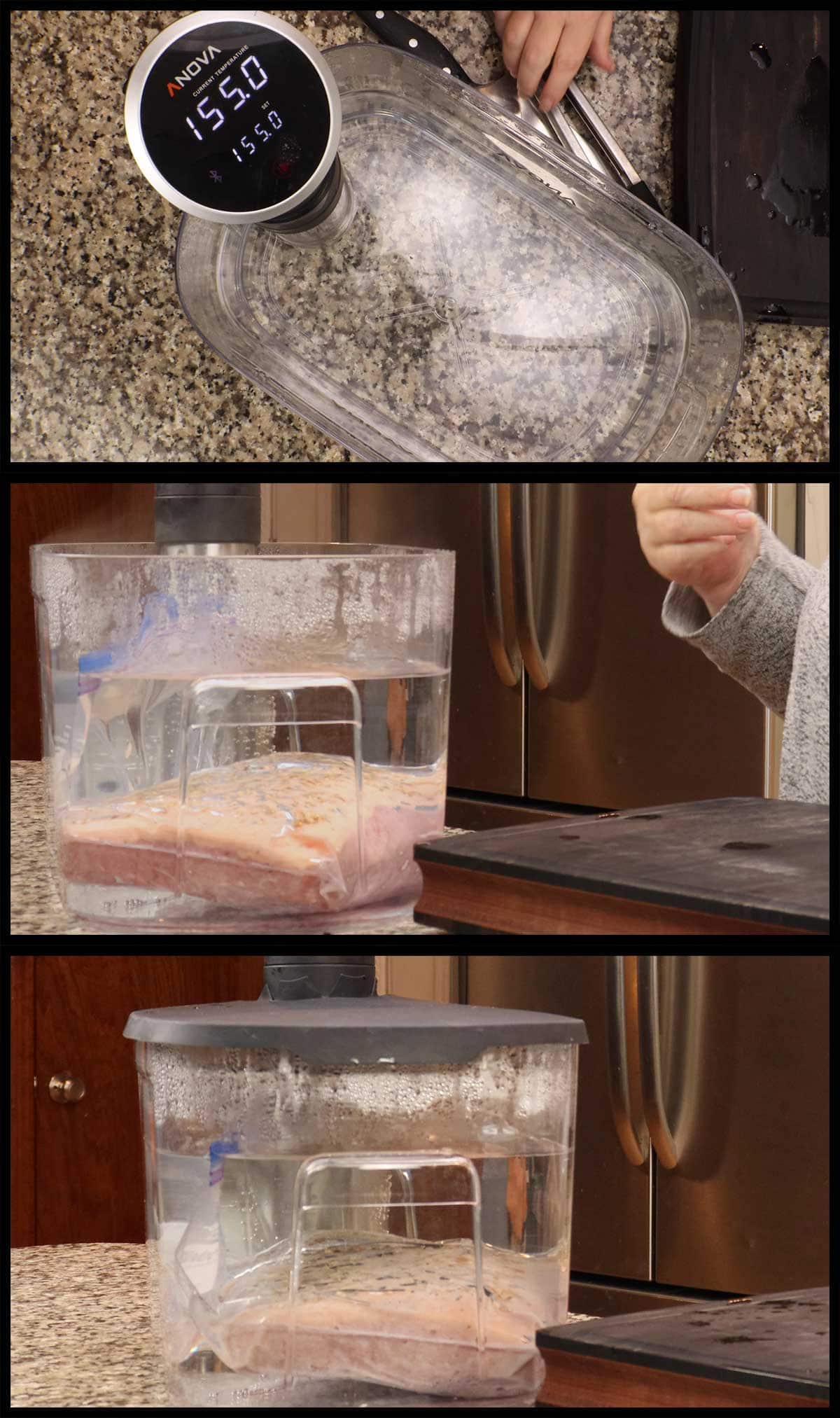
If your sous vide appliance has a time setting, set it to your desired time based on the temperature you set. I did 155℉ for 36 hours.
If you have the Ninja Foodi Pressure Cooker & Air Crisper with the sous vide function, you might only be able to set the time for 24 hours. What you can do is set it for 24 hours and let it go 8 hours and without turn the Ninja Foodi off, increase the time to 24 hours again*. You don't want to let the time run out and then reset it or the Ninja Foodi will go through the reheating process and I've found that can really throw off your water temperatures.
*If 8 hours happens at an inconvenient time, let it go for 10 or even 12 hours and then increase the time to either 16 hours or 14 hours.
Serving
When your desired time is up, remove the bag with the corned beef and juices. Carefully open the bag to remove the corned beef. You might want to set the entire bag into a bowl in case any of juices spill out.
Don't throw away those juices! They are perfect for braising cabbage or using as your cooking liquid when you want to add cabbage, potatoes, and carrots to your corned beef. At 155℉ for 36 hours, I had about 2 cups of liquid.
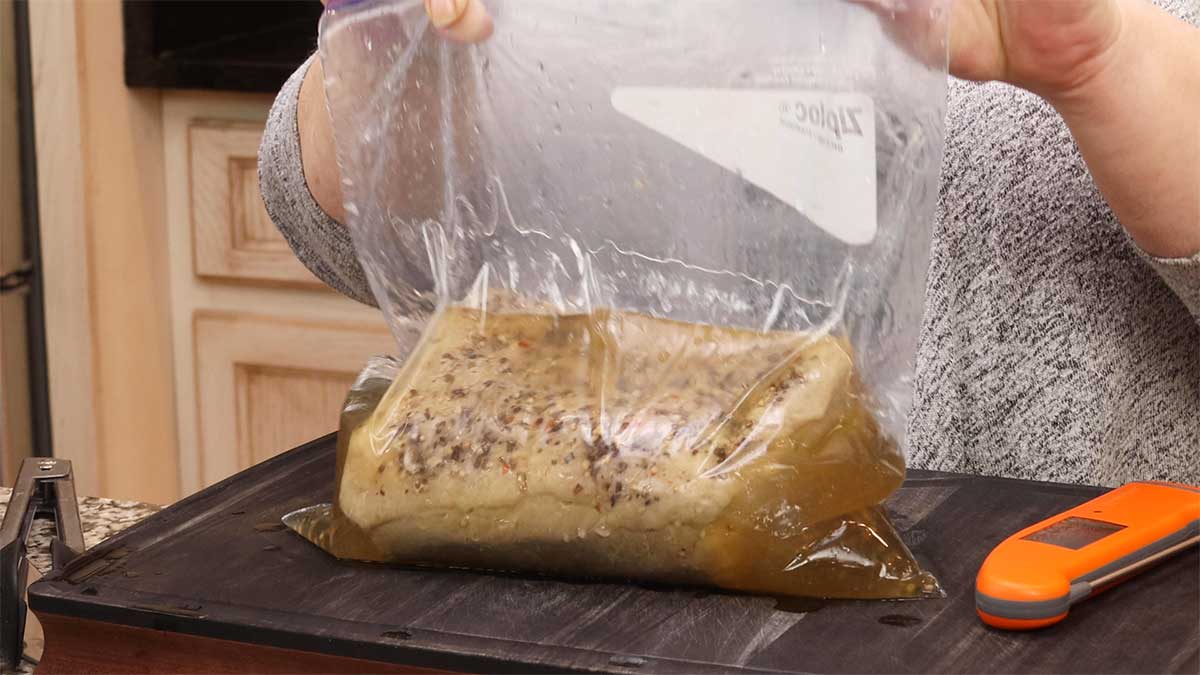
You can slice and serve now or finish your corned beef by searing the fat cap or do what I did and apply a glaze and air fry it. See below for details.
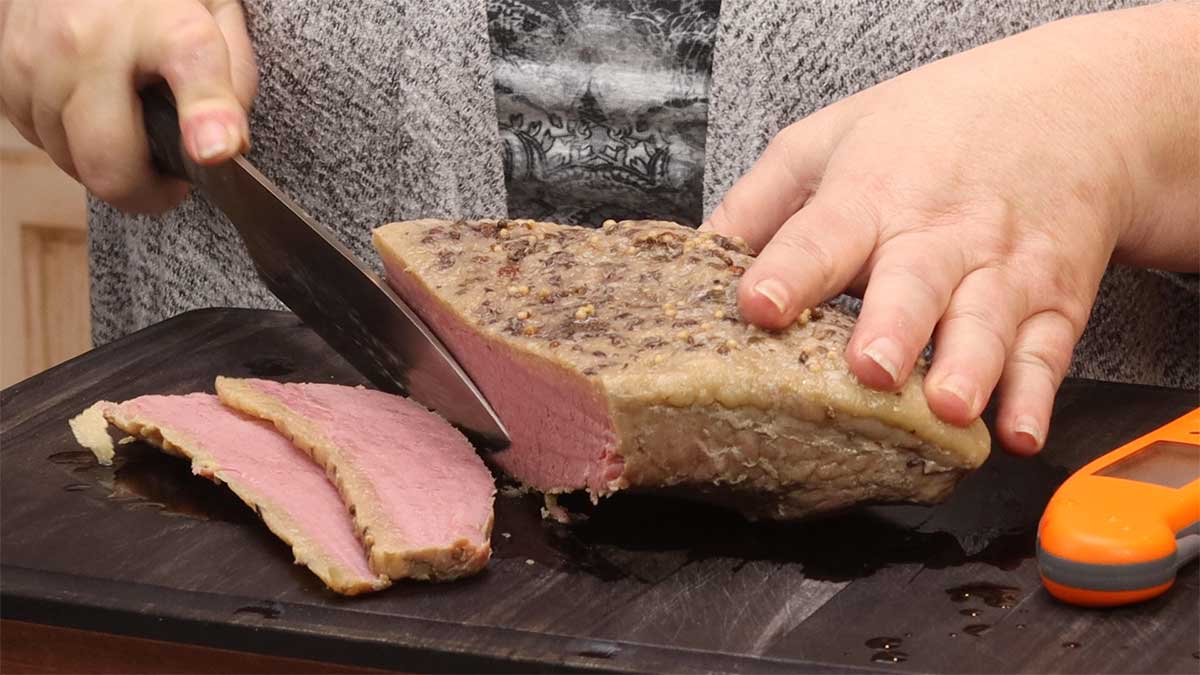
Corned Beef & Cabbage Dinner using Sous Vide Corned Beef
One of the beauties of using the sous vide method for making your corned beef is you can do it days in advance! So, instead of spending hours and hours in the kitchen on the day you want to serve your corned beef dinner, you can make the corned beef ahead of time, and then quickly finish it up the day you want to serve it.
This can be done in many different ways, but the quickest and easiest in my opinion is using an electric pressure cooker like the Ninja Foodi. My preference is to Pressure Cook and then Air Crisp, but you can save 30 minutes if you only want to do the pressure cooking part!
Take your corned beef out of the sous vide bath or out of the refrigerator if you made it ahead of time (I would take it out about an hour before you want to make dinner).
Cut up your cabbage, carrots, and potatoes. You can use as many or as few as you like, just make sure everything will fit in the pot of your pressure cooker. For the 6.5qt Ninja Foodi, I used ¾ of a medium to large head of cabbage cut in quarters, 5 carrots and 5 medium size potatoes cut in quarters. I don't even peel my potatoes!
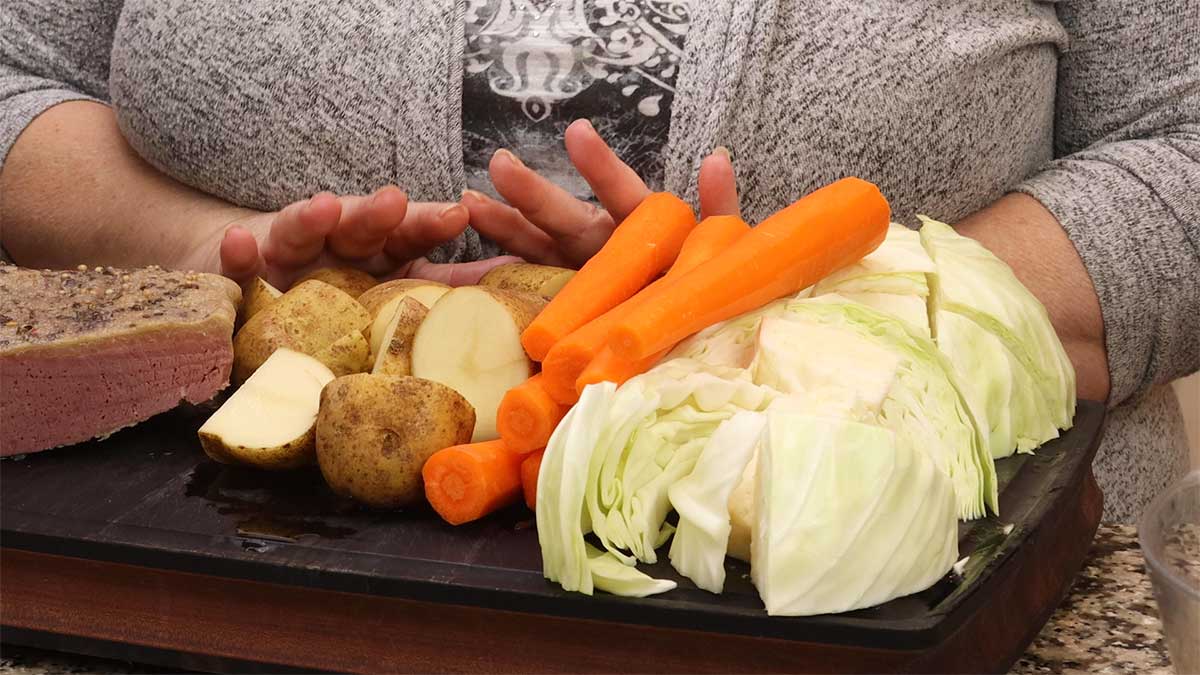
Place the sous vide cooking liquid into the inner pot and add in extra spices if desired. I use 1 bay leaf, ½ teaspoon of mustard seed, ½ teaspoon of coriander seed, and ½ teaspoon black peppercorns. Add the cabbage on the bottom so it cooks fully, then the carrots (peeled and whole), and the potatoes.
If your corned beef is cold from being refrigerated, add it on top to warm up during the short PC time.
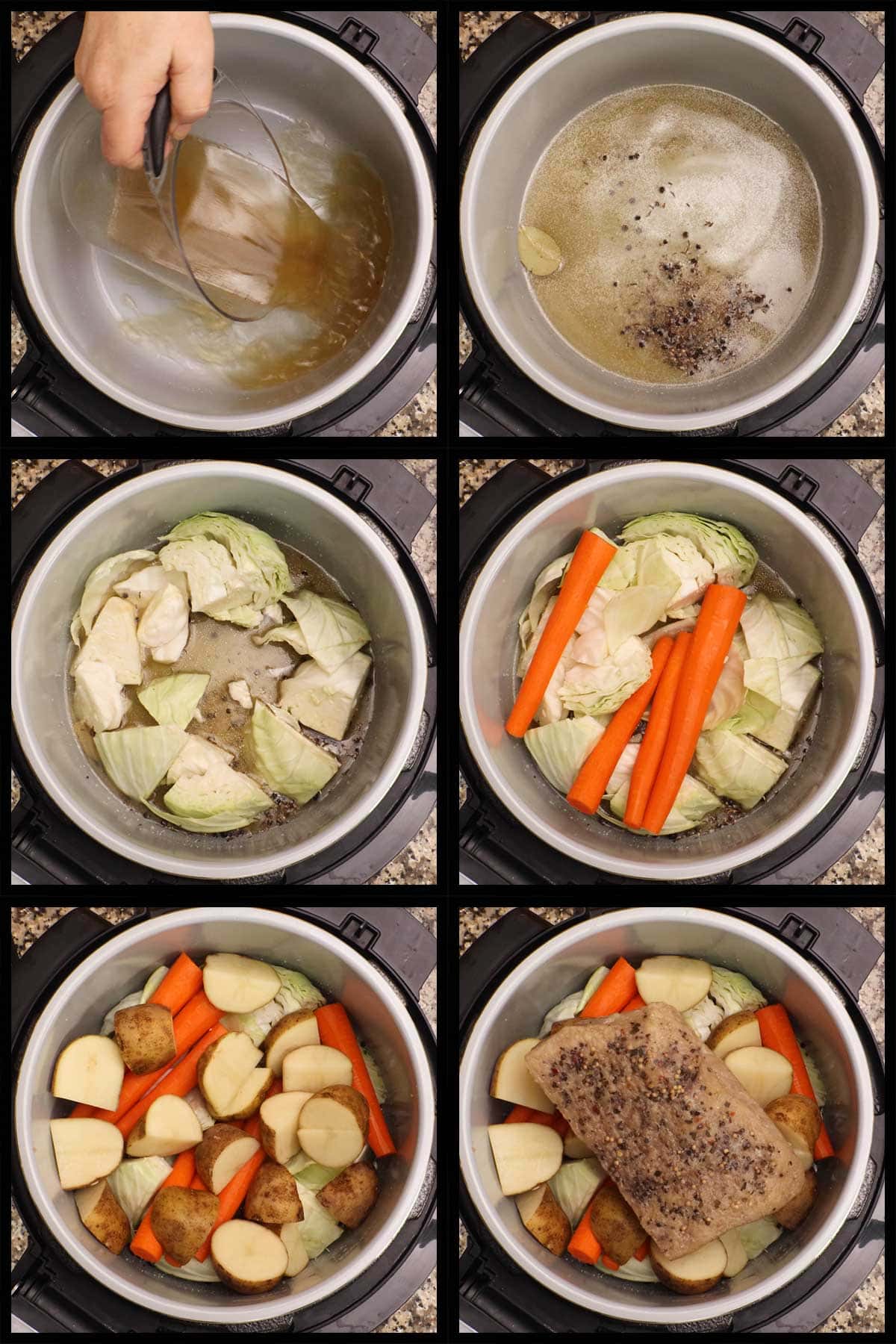
Put the lid to the pressure cooker on and set on high for 2 minutes. When the time is up, do an immediate release.
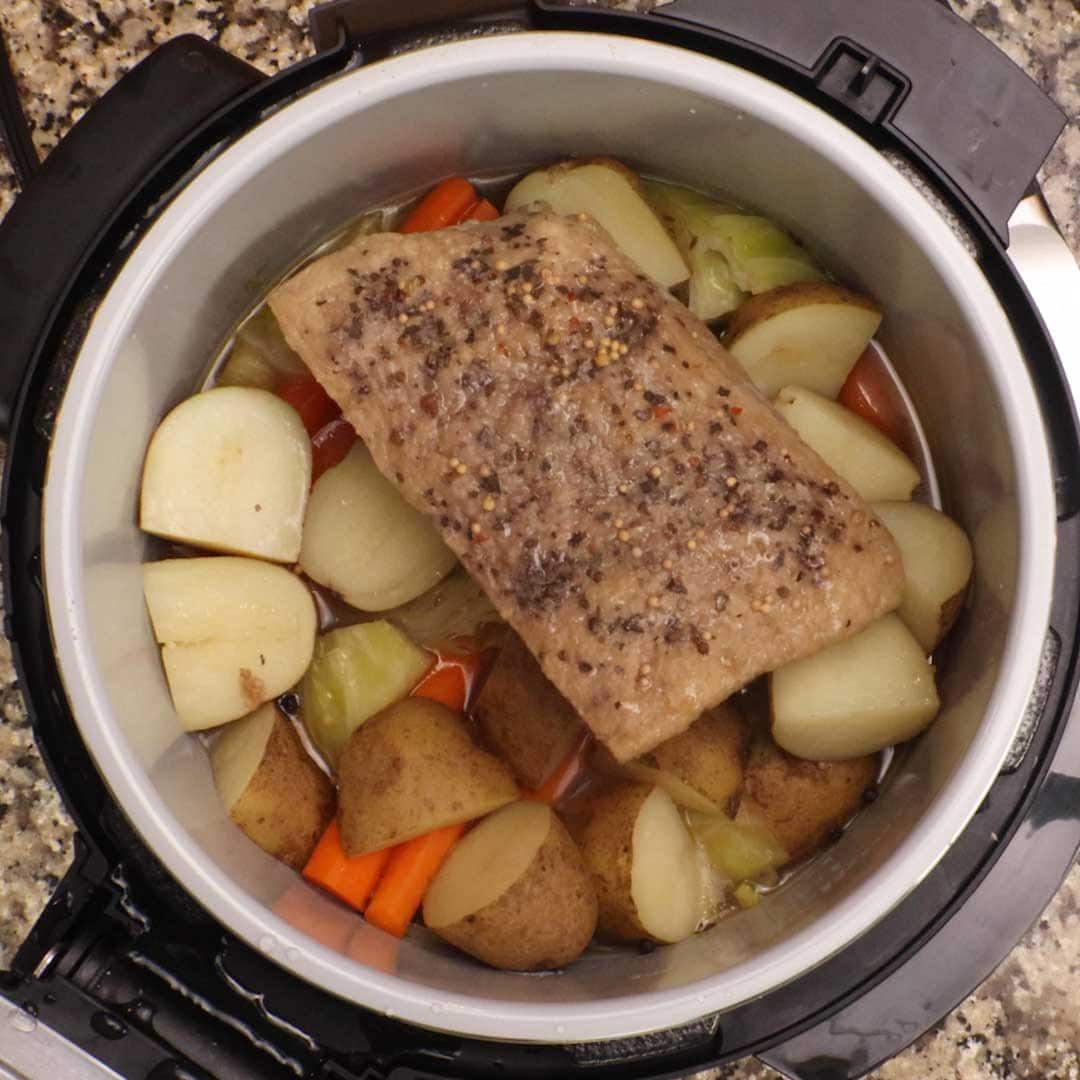
You can serve everything now OR crisp up the corned beef fat cap and the veggies a little like I did in the video below.
The glaze I used is as follows:
- ¼ brown sugar
- ¼ cup balsamic vinegar
- 1 Tablespoon Dijon mustard
Mix all of the ingredients together and pour over the corned beef while it's in the pot. I didn't worry about draining the liquid, but if you want your veggies to get more browning, then you probably want to drain off the liquid.
Close the crisping lid and set the air fry/ air crisp temperature to 400℉/200℃ and the time for 20 minutes.
Remove the corned beef and slice. Serve with the potatoes, carrots, and cabbage.
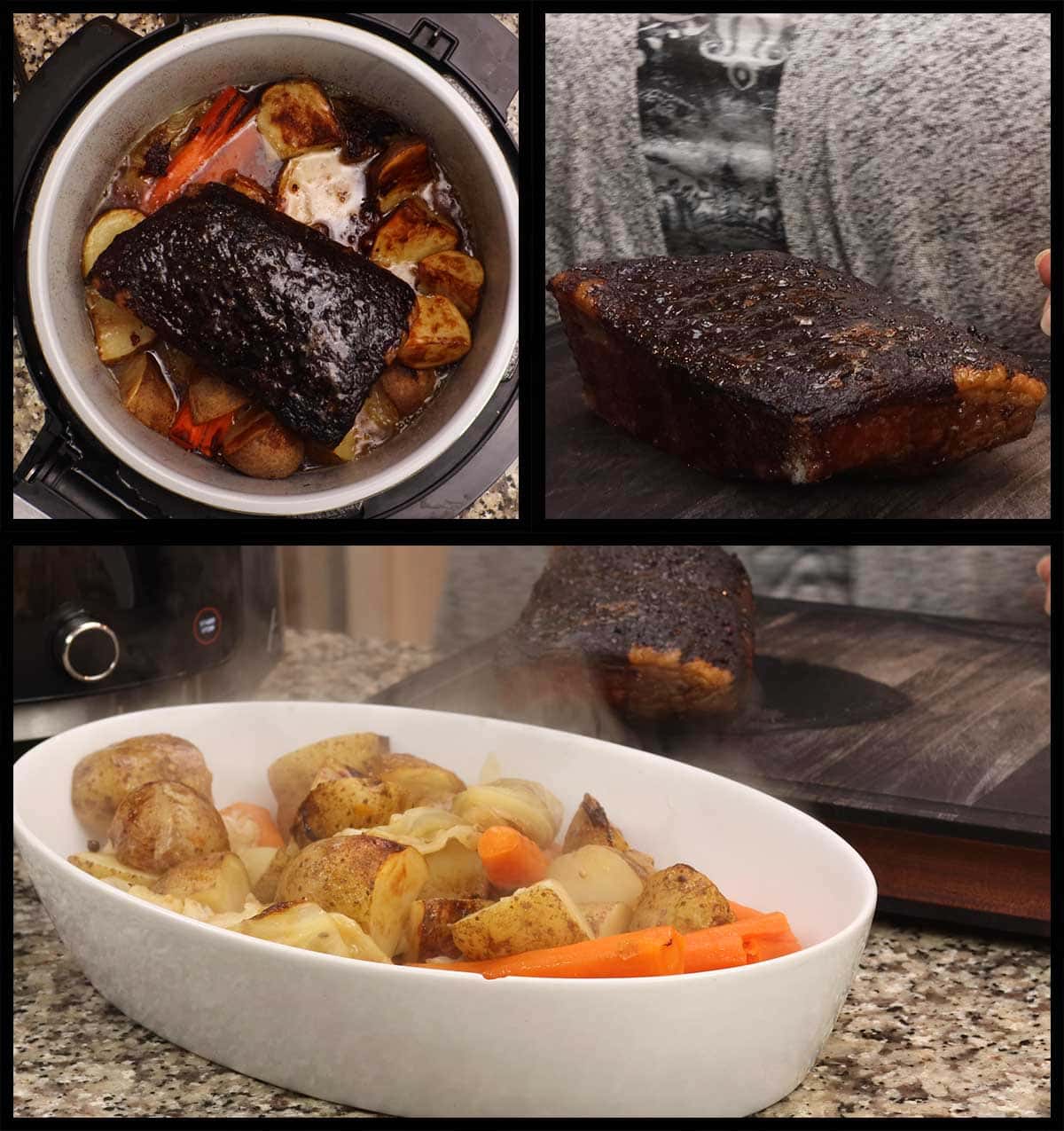
Enjoy!
If you want to watch how I made the complete dinner, here is the video.
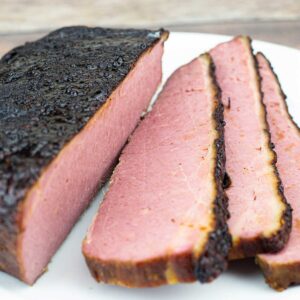
Sous Vide Corned Beef
Melt in your mouth corned beef that is sliceable making it perfect for a corned beef and cabbage dinner or for sandwiches!
Add to My Favorites Saved! Print Recipe Pin Recipe
-
Sous Vide Circulator
Turn this on when cooking to prevent your screen from going dark
- 4 lb corned beef with spice packet
-
Fill your sous vide container with water and secure the sous vide circulator to the container. Set your desired cooking temperature based on cooking times and temps in the note section and cover the container. My favorite temp/time is 155℉ for 36 hours. Allow the water temperature to reach the desired temperature. *If you are using the Ninja Foodi Pressure Cooker & Air Crisper, see the note section below for details on setting it up for sous vide cooking.
-
Rinse the corned beef with cold water and use the seasoning packet to season the fat side of the corned beef.
-
Place the corned beef into the ziplock freezer bag or vacuum bag and seal either using the water displacement method (ziplock bag) or use your vacuum sealer to remove the air from the bag and seal it.
-
When the temperature reaches the desired temperature, place the sealed bag into the water bath. Sous Vide for the time period you select in the chart below. I did 36 hours.
-
When the time is up remove the bag from the water bath and set it into a large bowl. Open the bag and remove the corned beef. Save the juices for making cabbage, potatoes, carrots if desired.
-
You can slice the corned beef and serve or sear off the fat side to crisp it up. I also like to apply a glaze and air fry the top.
Cooking Temperatures & Timings
Tender and sliceable steak-like corned beef with the least amount of moisture loss ~ 140℉/60℃ 36-48 hours.
Tender and sliceable steak-like corned beef ~ 155℉/70℃ for 24-36 hours.
Tender, sliceable. Slightly softer than steak-like ~ 165℉/75℃ for 16-24 hours.
Tender, flakey and more fall apart than lower temperatures with more liquid loss ~ 180℉/80℃ for 10-16 hours.
Special Ninja Foodi Pressure Cooker & Air Crisper Instructions for set up and timing.
Fill the inner pot with 10-12 cups of liquid. Put the pressure lid and make sure it is vented or or close the smart lid and select the sous vide function. Set your desired temperature based on cooking chart above and press start. The pot will heat up in about 10-15 minutes. During this time get your corned beef seasoned and into the sealed bag.
When the display prompts you to add food, open the lid and place the sealed bag into the inner pot. Make sure it is submerged fully. Put a plate or small bowl on top if needed. Close the lid or put on the pressure lid and set the time based on the chart above.
* The Ninja Foodi only goes up to 24 hours, but if you want to do the 36 hour cook, you just need to add time after 12 hours. For example if the display reads 12 hours left, just add 12 more hours to the time. You don't want to allow the time to get to zero and then reset it for 12 more hours or it will reheat the water again and that can cause some issues with the temperature.
If you want to turn your sous vide corned beef into a complete dinner using a pressure cooker & air fryer, here are the instructions.
Ingredients
- ¾ head of cabbage
- 5 whole carrots
- 5 medium potatoes
- sous vide corned beef
- ¼ teaspoon of the following; black peppercorns, mustard seed, coriander seed.
- 2 cups of the corned beef juices from sous vide cooking
Glaze Ingredients
- ¼ cup brown sugar
- ¼ cup balsamic vinegar
- 1 Tablespoon Dijon mustard
Mix up the glaze ingredients in a small bowl. Cut the cabbage into chunks, peel & cut the ends off of the carrots and leave them whole, quarter the potatoes (peeled or unpeeled).
In the inner pot of your pressure cooker add 2 cup of the corned beef juices along with the extra spices. Add the cabbage, carrots, and potatoes. If your corned beef is cold, place that on top. Put the pressure lid on and cook on high for 2 minutes. Immediately release the pressure.
If you have a crisping lid for your pressure cooker, pour the glaze over the top of the corned beef (if you didn't warm it up, set the corned beef on top of the vegetables before pour on the glaze). Air fry/ Air Crisp on 400℉/200℃ for 20 minutes.
If you don't have a crisping lid and want to use the glaze, place the vegetables into a baking dish without the cooking liquid and place the corned beef on top. Pour the glaze over and put in the oven. Use the broil setting on your oven and broil for 10 minutes or until the fat has crisped up and the glaze is set.
Serve & Enjoy!
Serving: 1 slice Calories: 374 kcal Carbohydrates: 1 g Protein: 28 g Fat: 28 g Saturated Fat: 9 g Polyunsaturated Fat: 1 g Monounsaturated Fat: 14 g Cholesterol: 102 mg Sodium: 2300 mg Potassium: 561 mg Vitamin C: 51 mg Calcium: 13 mg Iron: 3 mg
Let us know how it was!
ABOUT THE RECIPE AUTHOR, LOUISE LONG
Louise is a full-time recipe creator and food blogger @ The Salted Pepper. She has over 30 years of experience with cooking and recipe development. She owned a restaurant for several years and was a full-time RN until retiring to blog full-time.

Louise has several very active Facebook groups that help people with the basics of cooking and getting the most out of the Ninja Foodi.
Ninja Foodi 101
Ninja Foodi Fresh & Healthy Meals
Simply Cooking with Louise
Seeing the need for easy, delicious, and high quality recipes, she is focusing all of her efforts creating recipes specifically for the Ninja Foodi. Her recipes are easy for the home cook to follow and provide step-by-step instructions.
Louise is also a YouTube creator and you can find most of her recipes in video format on The Salted Pepper YouTube channel.
She is very responsive to messages and eager to help in any way she can.
I WOULD LOVE TO SEE WHAT YOU ARE COOKING UP IN YOUR NINJA FOODI! TAG ME @THESALTEDPEPPER ON YOUR FAVORITE SOCIAL MEDIA PLATFORM WHEN YOU MAKE A DISH!
BE SURE TO FOLLOW THE SALTED PEPPER RIGHT HERE ⇓⇓⇓⇓⇓
Source: https://thesaltedpepper.com/sous-vide-corned-beef/
0 Response to "Sous Vide Corned Beef Brisket Spices"
Post a Comment